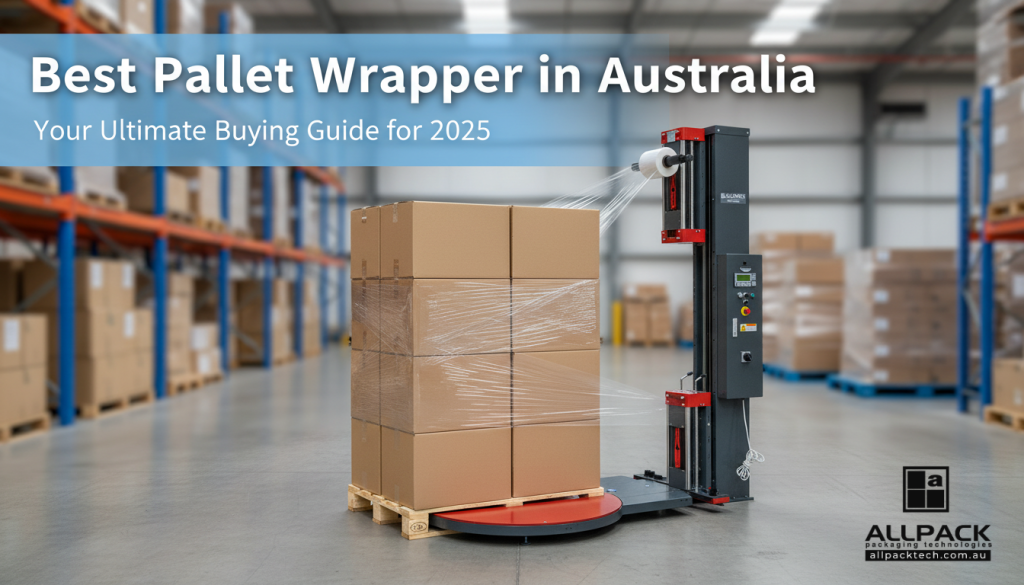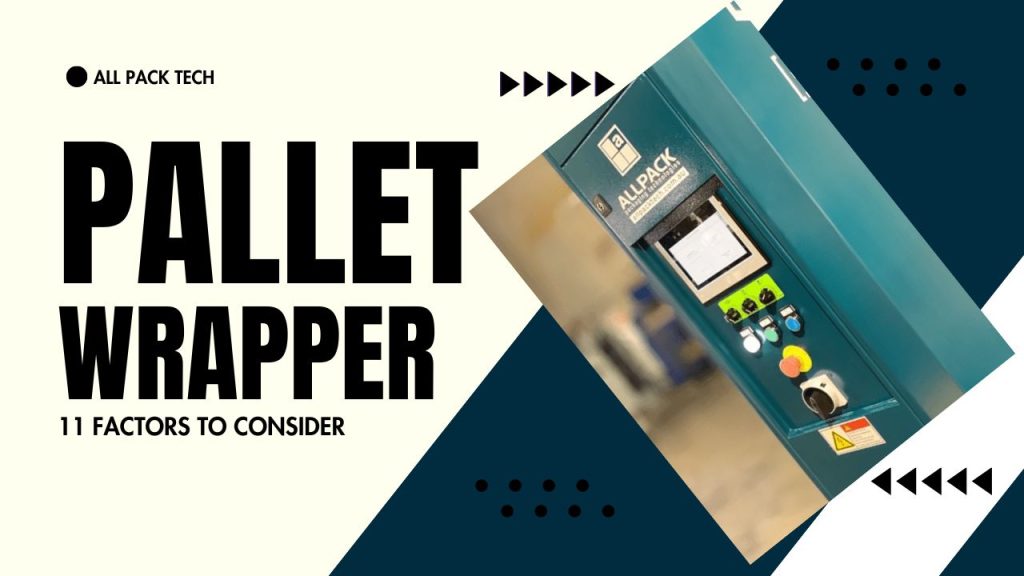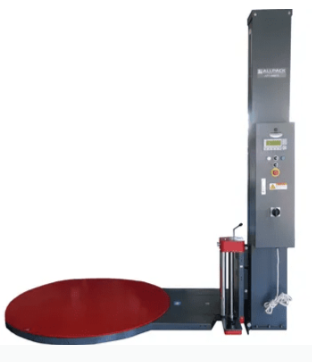Choosing the Best Pallet Wrapper in Australia: Your Ultimate Buying Guide

Tired of watching pallet loads wobble, tape snap, and your team spend half the day wrestling with stretch film? If so, you’re definitely not alone. And yes, there’s a far smarter way to keep your pallets secure.
In fast-paced warehouses and manufacturing facilities, a pallet wrapper is one of the most essential tools for safe, consistent and efficient packaging. The right pallet wrapping machine can boost productivity, reduce film waste, and cut the risk of damaged goods. But with so many models and features on the market, picking the right one can feel overwhelming.
That’s where Allpack Packaging Technologies comes in.
In this guide, we’ll walk you through everything you need to know, from choosing between manual, semi-automatic and fully automatic wrappers, to understanding load requirements, smart features, film options, and how to save big on long-term costs.
Ready to find the pallet wrapper that delivers rock-solid reliability, cleaner wraps and better performance for your business? Let’s get started.
What Is a Pallet Wrapper & Why Your Warehouse Needs One?
A pallet wrapper (also known as stretch wrapper, stretch film machine or pallet wrapping machine) is the fast, reliable, and automated solution for wrapping a pallet of goods in a layer of stretchable plastic film. It keeps boxes and products snug, stable and protected for storage and transport.
Instead of slow, tiring hand-wrapping, the machine spins the pallet while the film carriage applies even, tensioned layers from the base to the top. This creates a tight, uniform package every time.
What a pallet wrapper actually does:
- Stabilises loads so pallets don’t shift or topple in transit.
- Protects goods from dust, moisture and minor impacts.
- Saves labour by replacing manual wrapping with a quick, repeatable machine cycle.
- Cuts film waste when paired with pre-stretch systems, lowering packaging cost per pallet.
In Australia, pallet wrappers are common in warehouses, distribution centres and manufacturing plants; anywhere pallets are prepared for storage or shipping. They’re ideal for operations that need faster throughput, consistent wrap quality, and fewer damaged deliveries.
In short, if you want safer shipments, faster packing lines and lower packaging costs, a pallet wrapping machine is one of the smartest investments you can make.
11 Tips to Choose the Best Pallet Wrapper in Australia & Save Big!

1. Choose Manual vs. Semi-Automatic vs. Automatic
Decide how much automation your operation needs.
- Hand-held pallet wrapper (a manual pole dispenser with stretch film) is very low cost and portable, but it requires full operator effort and is slow.
- Semi-automatic turntable wrapper is a popular mid-range choice. The machine spins the pallet under the film, but an operator still applies and removes the film. Semi-auto wrappers can wrap pallets about twice as fast as a person doing it by hand, and they are much less expensive than full-auto models.
- Fully automatic pallet wrappers (electric-powered turntables or carousels) require minimal human input. The film carriage moves and cuts automatically and the load is wrapped with a push of a button.
Automatic models wrap faster and more consistently, making them worth the extra cost if you process a large volume of pallets. In short, if you only wrap a few pallets per day, a semi-auto or even a hand-held stretch wrapper may suffice. If you’re doing dozens per day, an electric, automatic pallet wrapper will save labour and pay for itself. (We cover cost vs. savings in Tip 8 below.)
2. Assess Your Pallet Loads (Size, Weight & Shape)
Your first step is understanding what you’re wrapping. How tall, heavy or odd-shaped are your loads? A machine must handle the heaviest and tallest pallet you’ll wrap.
For example:
- tall loads may need a height-sensing wrapper
- very heavy loads require a robust turntable
- irregularly shaped or unstable loads might benefit from a rotary-arm or orbital wrapper that grips the load more evenly
Also think about film containment force; heavier loads need tighter film tension. By matching the wrapper to your load dimensions and weight, you avoid overloading the machine or under-wrapping the pallet (which can lead to damage).
3. Consider Speed & Integration
How quickly do you need to wrap each pallet? Check the machine’s cycle time or pallets-per-hour rating.
A basic turntable can do 10–15 loads per hour, whereas high-speed automatic or rotary-arm wrappers can exceed 50–100 per hour. If speed is critical, look for models with variable speed controls or dual film carriages.
Additionally, think about workflow integration.
Will the pallet come to the wrapper by forklift one at a time, or will you place it on a conveyor-fed wrapper? Do you need a lifter (pallet turntable that rises) or an inch-winder start? Make sure your floor space and fork-truck path allow easy loading/unloading.
Matching the pallet wrapper’s speed and layout to your operations ensures smooth throughput without bottlenecks.
4. Compare Wrapping Machine Types (Style)
Different wrapper styles suit different applications. Below is a quick comparison:
| Wrapper Type | Best For | Pros | Cons |
| Hand-held (Pole Wrapper) | · Occasional use · low volumes | Very affordable, portable | Slow, labour-intensive |
| Semi-Auto Turntable | · Medium volumes · stable loads | Low cost, faster than manual | Needs operator for each wrap |
| Semi-Auto Rotary Arm | · Heavy/tall loads · small space | Excellent containment, small footprint | Higher cost, lower speed |
| Automatic Turntable | · High-volume · uniform pallets | Fastest cycles, minimal labour | Most expensive, space required |
| Orbital (Ring) Wrapper | · Cylindrical or odd shapes | Wraps awkward shapes easily | Very niche, slower cycle times |
Review your pallet type against this list. For example, turntables are ideal for uniform box pallets. For very tall or heavy loads, a rotary-arm wrapper keeps the film under tension better and has a smaller footprint. Orbital wrappers (tables with rings) are specialised for long cylinders or drums.
5. Focus on Film & Pre-Stretch Capabilities
The best pallet wrapper is only as good as the film it uses. Most wrappers work with stretch wrap (pallet wrap); a stretchy polyethylene film that clings and holds loads tightly.
High-quality stretch film is strong yet inexpensive.
Look for machines with pre-stretch film carriages. These devices stretch the film before applying it, using less film per pallet and improving containment. Some models have friction brakes or variable tension. Like our top models include a friction-brake film tension system, so you can adjust wrap tightness to your load’s needs.
Moreover, check for built-in film cutters and photoeyes to stop the wrap at the right height. These features save time and reduce waste.
6. Plan for Space & Power Requirements
Check the machine dimensions against your floor space. For instance,
- Turntable wrappers need clearance around the entire pallet
- Rotary arm wrappers need overhead clearance for the swinging arm
Make sure forklifts can access the machine easily. Also note electrical requirements. Many automatic wrappers run on 240V power, some have battery-powered carriages, and even semi-auto turntables may be 110V or pneumatic.
If your facility has lower ceilings or strict power limits, select accordingly. For example, compact semi-automatic models may be better for small workshops, whereas full-size automatic turntables fit large warehouses.
Also consider mobility; some wrappers have wheels or modular designs, while others are stationary fixtures.
7. Prioritise Safety & Ease of Use
Modern pallet wrappers include safety features to protect operators. Look for machines with emergency stop buttons, safety guards around moving parts, and interlocks on access doors. Some automatic wrappers even have light curtains or sensors to shut off the machine if someone enters the wrap zone.
Ease of use is also important. A user-friendly control panel or touch-screen simplifies training. For semi-auto models, ergonomics matter; a powered lift turntable reduces bending, and walk-down conveyors can lower the load onto the table. So, choose a pallet wrapper that not only wraps well, but also keeps your crew safe and productive.
8. Balance Price vs. ROI (Return on Investment)
When shopping, compare the pallet wrapper price to the labour and material savings it provides.
- Lower-cost wrappers for sale may seem attractive upfront, but they might be slower or less durable.
- A semi-automatic unit is generally less expensive than an automatic model, yet still roughly doubles the speed of hand wrapping.
- Full-automatic machines cost more initially, but their higher speed and reduced labour (and film savings from pre-stretch) justify the investment.
Do the math for your operation: estimate how many hours of wrapping you’ll save each week, and how much film you’ll conserve. Often a higher upfront automatic pallet wrapper price pays for itself within months in a busy facility.
9. Check Maintenance, Warranty & Support
The best machine will be one you can keep running for years. Review warranty terms (labour vs parts) and ask about spare part availability. Simpler machines (like basic turntables) have low maintenance needs. High-tech models (with PLC controls and motors) may need periodic servicing.
Choose a reputable packaging equipment supplier, for example, Allpack Packaging Technology has stocked parts and service teams for decades. See if your vendor offers on-site setup, training or maintenance contracts. A good dealer will also help you with accessories like replacement rollers, film dispensers, and pallet strapping machines for a complete solution.
10. Test It First
Don’t buy sight unseen. Ask every supplier for a live demo or on-site trial using your actual pallets, products and film. A quick test run will tell you more than specs ever will. Australian suppliers commonly offer presale checklists and demo trials for this exact reason; use them.
What to test during a demo:
- Real cycle time (pallets/hour) with your typical load and film.
- Film consumption — does the machine’s pre-stretch or carriage settings actually save film?
- Wrap quality — check containment, top/bottom coverage and film breakage.
- Operator UX — is the control panel intuitive for your staff and how long is training?
- Noise, footprint & integration — watch how it sits in your actual space and how pallets enter/exit.
- Spare parts & service response — ask for lead times for common parts and average service turnaround in your state. Local vendors often publish spare-parts turnaround and warranty details — check those before you sign.
While you’re at it, confirm safety and standards compliance. Pallet wrapping machines fall under Australian machine safety standards. Make sure the demo machine has the required guards, emergency stops and documented safe-operating procedures. This protects staff and helps avoid costly compliance headaches.
And, a short trial exposes hidden problems long before you commit. This lets you compare real total cost of ownership, not just sticker price.
11. Compare Equipment Suppliers & Get Quotes
Finally, shop smart by comparing different models and vendors. For example, Look at Allpack’s lineup. Our partner Youngsunpak makes the WRAP-IT series of semi-auto and fully-auto machines.
- WRAP-IT FB (semi-auto) model has a friction-brake tension system and height-sensing arm, making it ideal for tall, heavy pallets.
- WRAP-IT FA (fully automatic) model includes power pre-stretch and automatic film cutting.
Don’t forget to consider service factors. Does the supplier include installation, operator training or trial periods? Get at least two quotes (our team can provide one in just a few hours). Compare features and warranty coverage on each.
By comparing carefully, you’ll ensure you “save big” on the right pallet wrapper, strapping machines, and other equipment to fully secure your loads.
Need reliable and affordable packaging solutions in Australia?
Contact Allpack Packaging Technologies for Quality Pallet Wrapping Solutions

Our experienced team will assess your application and recommend the best option. We offer competitive pricing on semi and fully automatic pallet wrappers, and we handle delivery and installation nationwide.
Additionally, we’ve been supplying a wide range of packaging equipment across Australia for over 20 years.
Feel free to call us at 08 9244 1515 or email us with your requirements. Let us help you achieve safer pallets and a more efficient packing line.
Shop Pallet Wrapping Machine Now
FAQs About Pallet Wrapper Australia
1. Are automatic pallet wrappers worth the investment?
Yes, automatic pallet wrappers are absolutely worth the investment for most Australian warehouses. They speed up your wrapping process, reduce manual labour, improve load stability, and significantly cut down film waste. For busy operations, the boost in productivity and the reduction in damaged goods which means the machine pays for itself within months.
2. Does pallet wrap shrink when heated?
Stretch wrap (used in pallet wrappers) does not shrink when heated, only shrink wrap does. Shrink wrap is applied loosely and then gently heated so it tightens around the products. This creates a protective seal. However, stretch wrap is applied under tension and clings naturally without needing heat.
3. How much does a pallet wrap machine cost in Australia?
In Australia, pallet wrapping machine prices generally start from $6,500 to $20,000 for semi-automatic models. Fully automatic pallet wrappers cost more depending on features like power pre-stretch, automatic cutting, height sensors, and load capacity. The final price also varies based on the pallet size, machine build quality, and level of automation your warehouse needs.
4. Which pallet wrapper is best for odd-shaped or tall loads?
Rotary-arm and orbital (ring) pallet wrappers are the best choice for tall, heavy, or irregular-shaped loads. These machines wrap the load without spinning it, which provides better containment and stability. For standard, uniform pallets, a turntable wrapper is usually sufficient.
5. How often should I service my pallet wrapper?
Most pallet wrappers should be serviced regularly based on usage, especially in high-volume warehouses. Many Australian suppliers offer scheduled maintenance programs every 12, 24, or 36 months, along with on-call repairs. Routine servicing helps prevent breakdowns, extends machine life, and keeps your wrapping process efficient.
